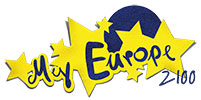‘Over the past 20 years, huge improvements have been made in the medical field,’ doctor Chase starts his speech. He had been asked to speak at the conference of 2030 of the European Medical Researchers Group in Zürich because of his groundbreaking research in the medical field. His biggest success was in 2026, when he together with a group of 36 European researchers, including me, found a cure for ALS. We dedicated this research to all European people, because they made this exceptionally successful collaboration possible by voting for a united Europe, eliminating all of the borders between European countries. This was the beginning of countless European collaborations, which would (almost) all bear fruit.
’20 years ago, diabetes was incurable. So was MS. So was gastroparesis and I could go on and on. Incredible scientists have worked extremely hard to cure these diseases and they succeeded. It’s now up to us to continue their work.
‘Now, you are probably all wondering why I am wearing these glasses. These glasses are currently showing me how all of my vital organs are doing. My heart rate is 76, my saturation level is 100 and I am taking 12 breaths a minute. My Google Glass is wirelessly connected to these sensors.’ He shows us 3 sensors the size of a hazelnut just below his collarbones.
‘This is not a revolution. We had Google Glass 17 years ago. However, we have recently discovered hundreds of new medical applications: those are the future. For example, you could have access to a 3D CT-scan of your patient’s heart while operating. If you want to, you could also have a supervising or consulting surgeon watching the operation while you perform it and giving you advice. The possibilities are endless, really.’ Doctor Chase starts a slideshow with possible features of Google Glass. Everyone in the conference room, different people from places all over Europe, is listening to him explaining all of these impressive new applications. To say the least, we are flabbergasted.
‘Patient files, a list of possible conditions and treatments, previous doctors and their contact details: you can have access to all of those features and more just by requesting them in your mind. The most exciting new feature, however, is the following: the Patient Simulator. With the Patient Simulator, you can basically do research, but without the actual patients. The test objects are merely digital replications of humans. Let’s say you think you’ve found a cure for Cystic Fibrosis. You can easily change the settings from ‘healthy patient’ to ‘patient with Cystic Fibrosis’ in the settings. Then, you fill in the box ‘treatment’ with the treatment you’re suggesting. Subsequently you can fill in more details about other medications and simulate your research. In a few seconds, you’ll have conducted a study without stress on the patients or having to apply for subsidies etcetera. This really is the future of research in the medical field.’ He says it all with a broad smile on his face and a twinkle in his eyes. His enthusiasm is contagious, I have to say, and most of my colleagues seem to think so, too.
‘But there’s more. You can predict whether surgery will have positive effect on a specific patient by changing the settings so the patient simulator is an exact digital copy of your patient. Then, you select the surgery you’re considering and you have access to a list of possible complications for the particular patient. You can even perform digital surgery on the patient with extremely realistic images and if you make a mistake, complications will occur. That makes the Google Glass a perfect study tool.
‘I think you’re all convinced of the importance of Google Glass in future medicine, but we need to explore these and more possible applications together. That’s the only way we can take Google Glass to the next level. This is why I’m asking all of you to join me in this exciting research. Together we can change the way we practise medicine every day. What do you say?’ Everyone in the conference room is cheering and applauding. Doctor Chase smiles.
‘The European voters have made all of these revolutionary collaborations possible. The only way we can thank them enough is by doing successful and important research. My dearest colleagues, together we have the power to improve medicine and we are definitely on the right track. Thank you.’ Doctor Chase takes a bow and the audience claps enthusiastically. Some of us even get up and cheer.
Later, at the banquet, every one of us is exchanging contact details. We are determined to keep changing medicine, as that is what we are meant to do. Doctor Chase made us realise it’s our duty.
